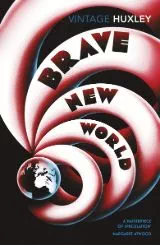The Last Argument of Kings...
The best fantasy books are the ones that tie...
By Susan Giles1688

4

Written by Aldous Huxley in 1931 and published in 1932, Brave New World is one of the most indelible dystopian social science fiction novels ever. Arguably, the only other work that could rival it in terms of renown is George Orwell’s 1984.
Both books reveal a deep unease about the future - or, our present - told through the prism of anxieties and socio-political concerns that were bubbling up during the first half of the Twentieth Century. Brave New World is perhaps the most referenced novel, one whose influence on the current spate of television shows and fiction works dabbling in science fiction is undeniable. From Black Mirror, Blade Runner, to The Leftovers, and even the newly released Ring Shout, Huxley’s stamp on the genre is inescapable.
So, what exactly is Brave New World about? This intricate novel is set in the dystopian World State, which is meant to be a futuristic version of London, UK. The years are set up as AF and BF, meaning after Ford and Before Ford, a nod to the accelerating industrial revolution, which upended much of the old way of life.
Children are not necessarily sent to school, but rather programming centers and are separated into castes. In fact, the entire world has its own distinct system of social class based upon embryonic states of being, wherein citizens are sorted as embryos as belonging to one class as opposed to another.
The hyper organization is meant to clearly mark the haves and have nots, and to keep society’s engines churning for the more powerful. State run propaganda is the name of the game, and free thought barely exists. Within this dark world, a love story of sorts emerges between Bernard Marx, an Alpha man - someone who is designated early on as a leader - and Lenina Crowne.
Together, they stumble upon dark rituals and the overbearing will of the state to bend its populations into submission. Bernard becomes angrier and angrier at the state of affairs, and is determined to upend this system, despite the odds.
Saying any more than that risks giving away the novel, whose world is so richly imagined that simply diving in and reading it is really the best way to gain a full understanding of just how breathtakingly complex Huxley’s work remains.
The world he created is based somewhat on our own reality, but one that is poisoned by the vested interests of scientists gone mad, the tentacles of an overbearing state, social class being the end all be all, and Anglo Saxon norms and traditions have been quashed in favor of something all too powerful, and sinister.
Upon its release, the novel was banned in several countries, ironically because it was seen as anti-religion in addition to being anti-government, and so on. The thing is, strong arguments have been made that postulate that Huxley’s nightmarish vision of the future is mostly informed by a deeply religious aversion to what he perceives to be the excesses of scientific innovation and the medical profession.
Powerful men (his reading of the world is overbearingly masculine, another valid critique) seek to play god and create worlds of their own making, reflecting their mirror image. Huxley believed that this would undoubtedly be the end game of governments and scientists in the future, and he wanted to warn readers of not losing our moral centers.
There is a lot to criticize about Huxley’s work, since it’s central ideologies can be rather problematic. However, Brave New World did manage to warn us of some excesses, one way or the other - rampant surveillance, authoritarianism, the inability to create more socio-economic equality, the realm of disinformation growing ever steady - these are all things to fear, and we have dealt with them in contemporary times, one way or the other. Therefore the novel remains as fresh and relevant as ever, despite some of the knottier aspects of its ideological underpinnings.
Updated 4 years ago